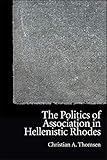The Politics of Association in Hellenistic Rhodes / Christian Thomsen.
Material type: TextSeries: New Approaches to Ancient Greek Institutional History : NAAGIHPublisher: Edinburgh : Edinburgh University Press, [2022]Copyright date: ©2020Description: 1 online resource (192 p.) : 9 B/W illustrationsContent type:
TextSeries: New Approaches to Ancient Greek Institutional History : NAAGIHPublisher: Edinburgh : Edinburgh University Press, [2022]Copyright date: ©2020Description: 1 online resource (192 p.) : 9 B/W illustrationsContent type: - 9781474452571
- 939.16
- online - DeGruyter
| Item type | Current library | Call number | URL | Status | Notes | Barcode | |
|---|---|---|---|---|---|---|---|
 eBook
eBook
|
Biblioteca "Angelicum" Pont. Univ. S.Tommaso d'Aquino Nuvola online | online - DeGruyter (Browse shelf(Opens below)) | Online access | Not for loan (Accesso limitato) | Accesso per gli utenti autorizzati / Access for authorized users | (dgr)9781474452571 |
Browsing Biblioteca "Angelicum" Pont. Univ. S.Tommaso d'Aquino shelves, Shelving location: Nuvola online Close shelf browser (Hides shelf browser)

|

|

|

|

|

|

|
||
| online - DeGruyter Love Across the Atlantic : US-UK Romance in Popular Culture / | online - DeGruyter Scottish Coal Miners in the Twentieth Century / | online - DeGruyter Archaeology of Empire in Achaemenid Egypt / | online - DeGruyter The Politics of Association in Hellenistic Rhodes / | online - DeGruyter Jewish Orthodoxy in Scotland : Rabbi Dr Salis Daiches and Religious Leadership / | online - DeGruyter Cosmetics in Shakespearean and Renaissance Drama / | online - DeGruyter Film and the Imagined Image / |
Frontmatter -- Contents -- List of Tables and Figures -- Acknowledgements -- Abbreviations of Epigraphic Corpora -- Maps -- Chapter 1 Introduction -- Chapter 2 Rhodian Democracy -- Chapter 3 The Oikos -- Chapter 4 Public Associations -- Chapter 5 Private Associations -- Chapter 6 Private Associations and Human Resources -- Chapter 7 The Civic Aspirations of Private Associations -- Chapter 8 The Corporate Polis -- Bibliography -- Index Locorum -- General Index
restricted access online access with authorization star
http://purl.org/coar/access_right/c_16ec
A new perspective on political organisation in Hellenistic Rhodes and the ancient Greek citystateThe first comprehensive study of Rhodes in more than 20 years and one of the few books dedicated to a single Hellenistic city-stateIntroduces the reader to Hellenistic Rhodes, an important, but also remarkably understudied, city-state of the ancient Greek and Roman world Challenges traditional assumptions about political organisation in the ancient Greek city-stateDocuments the existence of an alternative conception of the ancient Greek city-state, which will inspire new approaches to the study of the ancient Greek city-state, politics and societyChristian Thomsen offers a study of political institutions on the island state of Rhodes – an important power in the eastern Mediterranean and the first city of the Hellenistic world. Using Aristotle’s notion of the polis as an ‘association of associations’ as its point of departure, Thomsen provides an analysis of political institutions, taking a broader view of what constitutes an institution than traditional studies of the ancient Greek city-state. Among the institutions surveyed are the family, civic subdivisions such as tribes and demes as well as private associations. He argues that these organisations served as important junctions in the networks of political elites and shaped the political landscape of Hellenistic Rhodes.
Mode of access: Internet via World Wide Web.
In English.
Description based on online resource; title from PDF title page (publisher's Web site, viewed 27. Jan 2023)


